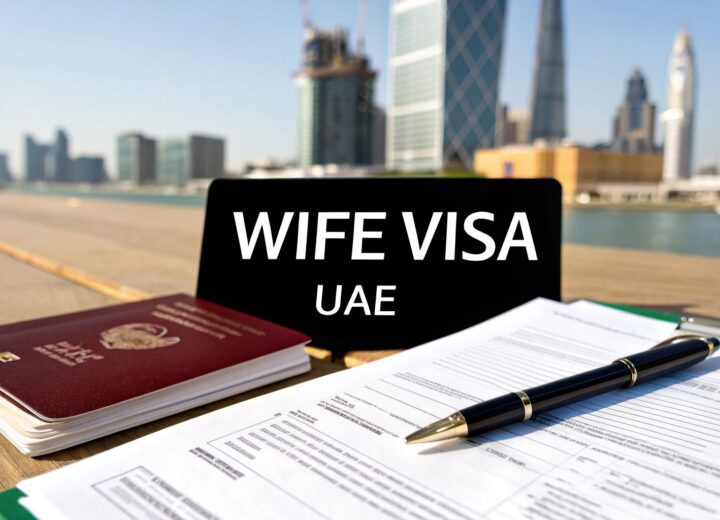Bringing your husband or wife to live with you in the UAE is a huge milestone for any expatriate family. The UAE spouse visa is designed for exactly this, allowing a legal resident to sponsor their partner, as long as they meet a few key requirements.
Essentially, you need to prove you can financially support your spouse and that your marriage is legally recognised. The government has set a minimum monthly salary of AED 4,000 and requires an officially attested marriage certificate to get started.
Do You Qualify to Sponsor Your Spouse in the UAE?
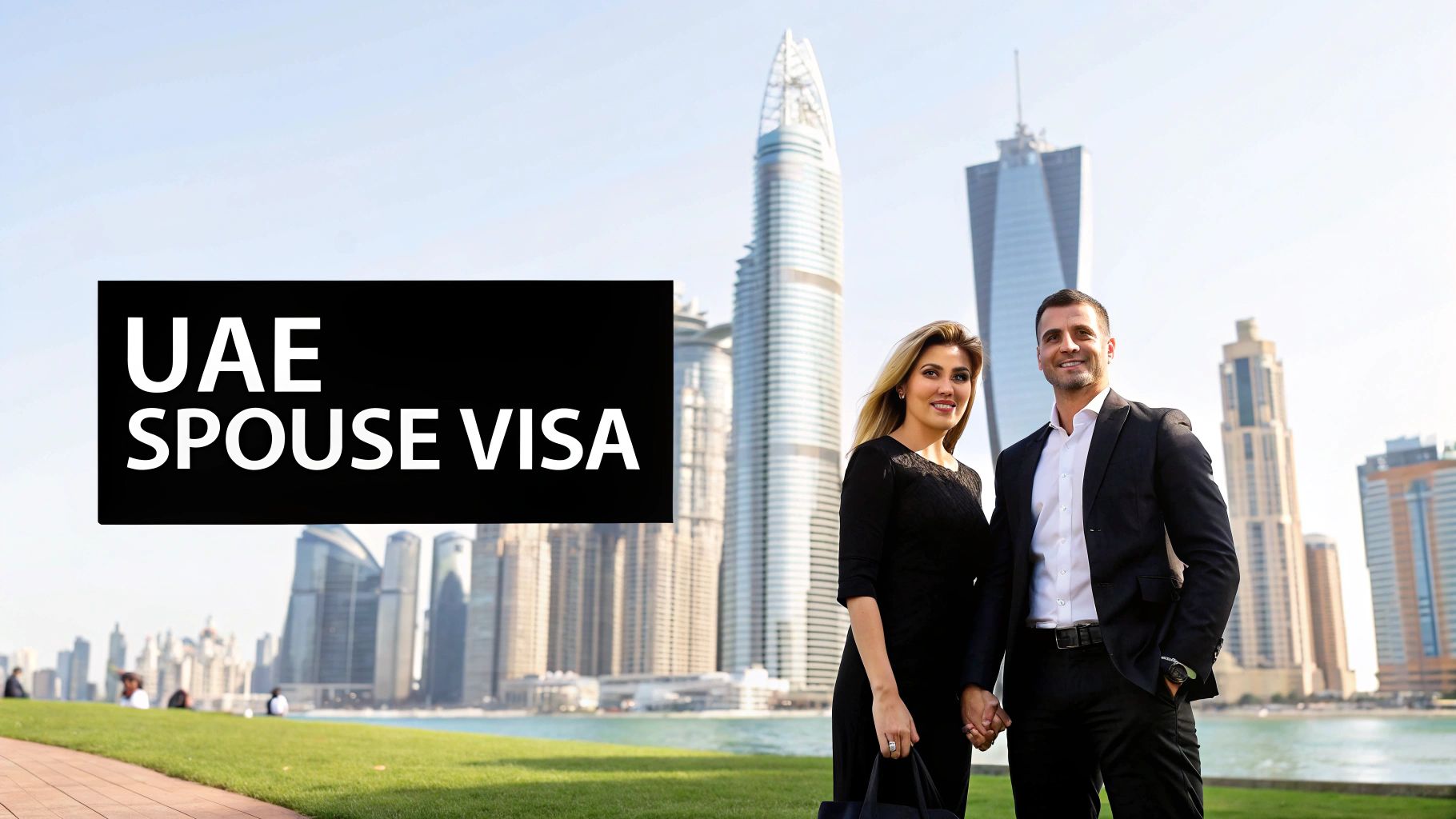
Before you get lost in the paperwork, the very first step is to check if you're actually eligible. Getting this right from the beginning will save you a world of time, money, and stress down the line.
The success of your application really boils down to two things: your salary and your marriage certificate. Think of these not as hurdles, but as the foundation of your case. The UAE authorities simply need to know that you can support your spouse without any financial trouble. Let's look at what that means for you.
The Minimum Salary Threshold
Your income is the first thing officials will look at. The rule is straightforward: to sponsor your spouse, you must earn a minimum monthly salary. This proves you have the means to support another person in the country.
Generally, the magic number is a minimum monthly salary of AED 4,000 (which is about $1,089). This requirement is central to the UAE’s family residency framework, ensuring sponsors can provide for their loved ones. A spouse visa is typically valid for one to three years and can be renewed as long as you continue to meet the criteria.
However, there's a little bit of flexibility here depending on your employment package.
Here’s a quick breakdown of what you need to earn.
Sponsor's Minimum Monthly Salary Requirements
| Sponsor's Status | Minimum Monthly Salary (AED) | Key Considerations |
|---|---|---|
| Without company accommodation | AED 4,000 | This is the standard requirement if you handle your own housing costs. |
| With company accommodation | AED 3,000 | This lower threshold applies only if your labour contract explicitly states that accommodation is provided by your employer. |
This distinction is important. The authorities need to see the accommodation benefit clearly mentioned in your official labour contract.
Let’s look at a real-world example. An IT consultant in Dubai earns AED 15,000 a month and rents his own apartment. He easily meets the AED 4,000 threshold. Meanwhile, a hotel manager in Abu Dhabi earns AED 10,000, but her contract includes a company-provided two-bedroom flat. She also qualifies, as her salary is well above the AED 3,000 minimum for those with company housing.
The Importance of a Legally Attested Marriage
After your finances, the next critical piece is proving your marriage is legitimate. It’s not enough for your marriage certificate to be valid in your home country; it must also be officially recognised by the UAE authorities. This involves a formal, multi-step process called attestation.
Submitting an unattested marriage certificate is a guaranteed rejection. The document needs to be stamped and verified by several government bodies to prove its authenticity. The typical journey for your certificate looks something like this:
- First, it’s attested by the relevant authority in the country where you were married (like the Ministry of Foreign Affairs).
- Next, the UAE Embassy or Consulate in that same country must add its stamp.
- Finally, once you bring the certificate into the UAE, it needs a final attestation from the Ministry of Foreign Affairs (MOFA) here.
Skipping any of these stages will bring your application to a halt. This attestation process is a core part of nearly every UAE residence visa application for family members, so it’s a good process to get familiar with.
Your Essential Document and Attestation Checklist
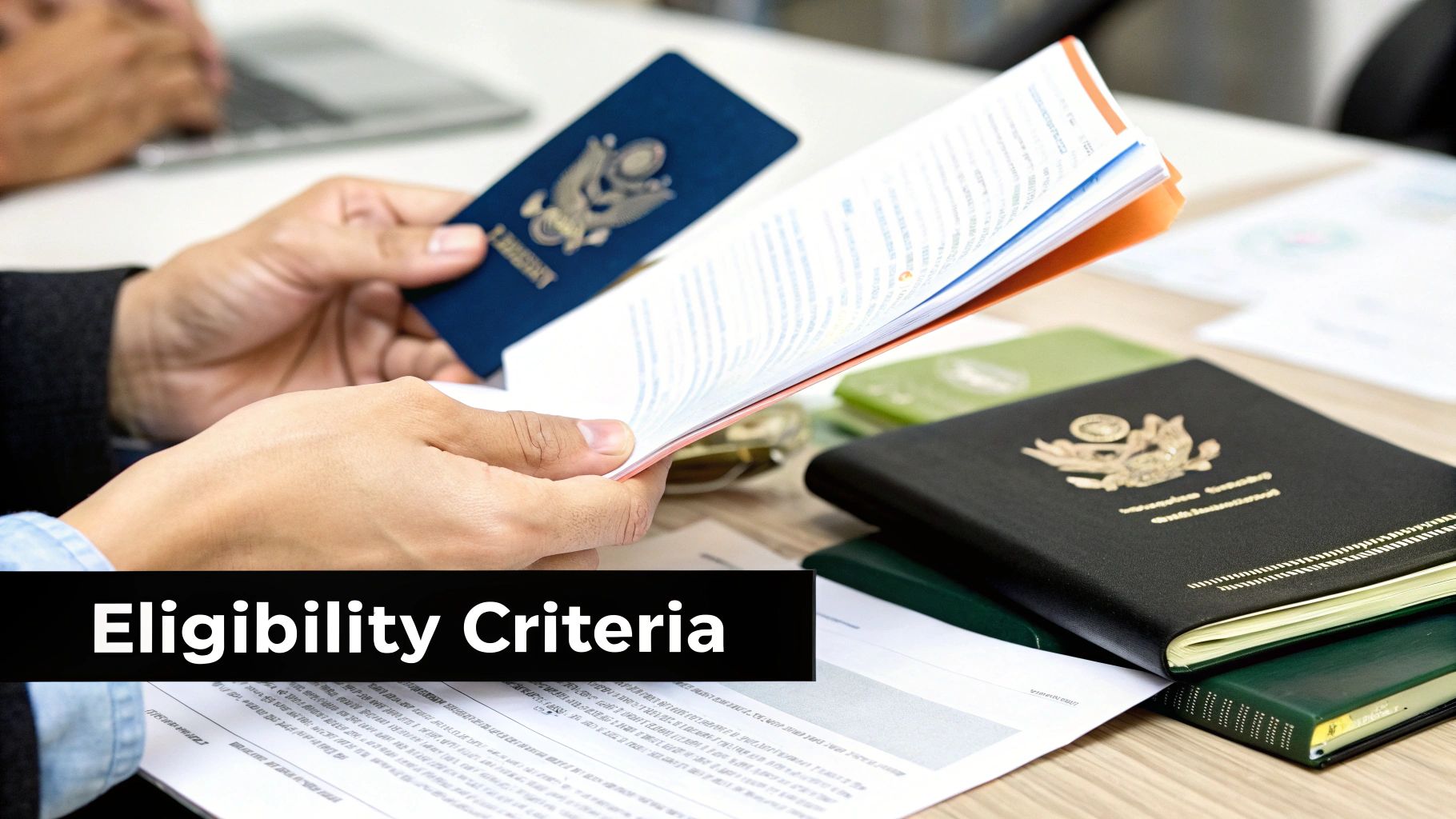
Let's get straight to it: a perfect application file is what separates a smooth visa process from a frustrating one. The smallest mistakes or a single missing document are the top reasons for delays. A bit of careful attention here will honestly save you weeks of hassle down the line.
Think of it this way: your tenancy contract proves you have a place to live, your labour contract confirms you meet the salary rules, and your passports establish who you are. Every document tells a part of the story.
Core Documents for Both Sponsor and Spouse
Before we even touch on the attestation process—which can be a beast—let's get the basic paperwork for both of you sorted. Having these ready makes everything else much simpler.
Here’s your initial checklist:
- Passport Copies: Clear, colour copies for both you and your spouse are a must. Make sure they are valid for at least six months.
- Photos: You'll need recent, passport-sized photos of your spouse. The key is a plain white background. It's always a good idea to check the very latest guidelines, as specs can sometimes change.
- Sponsor's Emirates ID: A clean copy of your valid Emirates ID card. Simple, but essential.
- Sponsor's Labour Contract: This is the official document from the Ministry of Human Resources and Emiratisation (MOHRE). It’s your proof of salary and profession, showing you meet the income requirements.
- Tenancy Contract (Ejari): Your registered tenancy agreement is non-negotiable proof that you have suitable housing. It must be registered through the Ejari system in Dubai or the local municipal equivalent in other emirates.
- Utility Bill: A recent bill from DEWA, SEWA, or ADDC in your name adds another layer of proof of your residence.
Getting all your financial paperwork in order is a big part of this. For some pointers, check out this guide on how to get your bank statement.
The Non-Negotiable Marriage Certificate Attestation
This is, without a doubt, the most critical—and often most time-consuming—part of the document prep. If your marriage certificate isn't properly attested, your application will be rejected on the spot. No exceptions. The entire multi-step process is designed to confirm its authenticity to the UAE government.
Your marriage certificate will go on a journey, collecting official stamps from different authorities in your home country and then here in the UAE.
Expert Tip: Whatever you do, don't use unofficial translators or agents promising shortcuts. A missed stamp or an incorrect translation will invalidate the entire document. You’ll be forced to start the whole expensive and lengthy process all over again.
Here’s the path your certificate needs to follow:
- Home Country Attestation: It all starts where you got married. The certificate usually needs a stamp from a government body like the Ministry of Foreign Affairs in that country.
- UAE Embassy Attestation: Next, it goes to the UAE Embassy or Consulate in your home country. This stamp shows that the UAE’s foreign mission recognises the document.
- Legal Translation: Once it's in the UAE, you need to get it translated into Arabic. This can't be just anyone; it has to be done by an official, sworn legal translator to ensure it's certified and precise.
- Ministry of Foreign Affairs (MOFA) Attestation: This is the final, crucial step. The UAE's own Ministry of Foreign Affairs puts its stamp on the document. This final seal of approval makes your marriage certificate legally valid for all official use in the UAE, including the visa application.
Family visas are a huge part of the UAE residency system. With expatriates making up about 88% of the population, there's a constant demand for family sponsorship. In 2023 alone, the issuance of over 158,000 Golden Visas—which also allow for family sponsorship—shows just how many people are looking to build long-term lives here with their families.
Additional Documents You Might Need
Depending on your job or situation, a few other documents might be required. For example, if you own a business and are sponsoring your spouse, you’ll submit your company’s trade licence and establishment card instead of a labour contract.
Sometimes, you might also be asked for a No Objection Certificate (NOC) from your employer. This is just a formal letter stating they are fine with you sponsoring your family. It's not always mandatory anymore, but it can be a useful supporting document to have. If you’re not sure what an NOC involves, we break it down in our guide on what a NOC is in the UAE.
The Application and Medical Test Journey Explained
So, you've got your stack of attested documents ready to go. This is where the real action begins. You’re about to turn that carefully prepared file into an official application for a UAE spouse visa. From here, the path involves lodging the application, undergoing a mandatory medical test, and the final, exciting step: getting the visa stamped in the passport.
Now, the first thing to figure out is where your spouse is. Are they already here in the UAE on a visit visa, or are they still back in their home country? Your answer to this question will decide your next moves.
Choosing Your Application Pathway
By far the most common—and frankly, often the easiest—route is to apply while your spouse is already in the UAE. Maybe they came in on a tourist visa. This approach lets you handle the whole process from start to finish without any international travel headaches. This is what's known as a 'change of status' or an 'in-country' application.
The other option is to kick things off while your spouse is still outside the UAE. In this scenario, you'll first apply for an entry permit for them. Once that’s approved, your spouse uses it to enter the country. You'll then have a specific window, usually 30-60 days, to complete the rest of the formalities like the medical exam and visa stamping.
For many families, the in-country 'change of status' option is the preferred route. It avoids the logistics of international travel and allows you to manage the entire process together in one place, which can significantly reduce stress and uncertainty.
No matter which path you take, the overall process for a UAE spouse visa follows a clear sequence. This infographic gives you a bird's-eye view of the main stages, from getting your papers in order to getting that final stamp of approval.
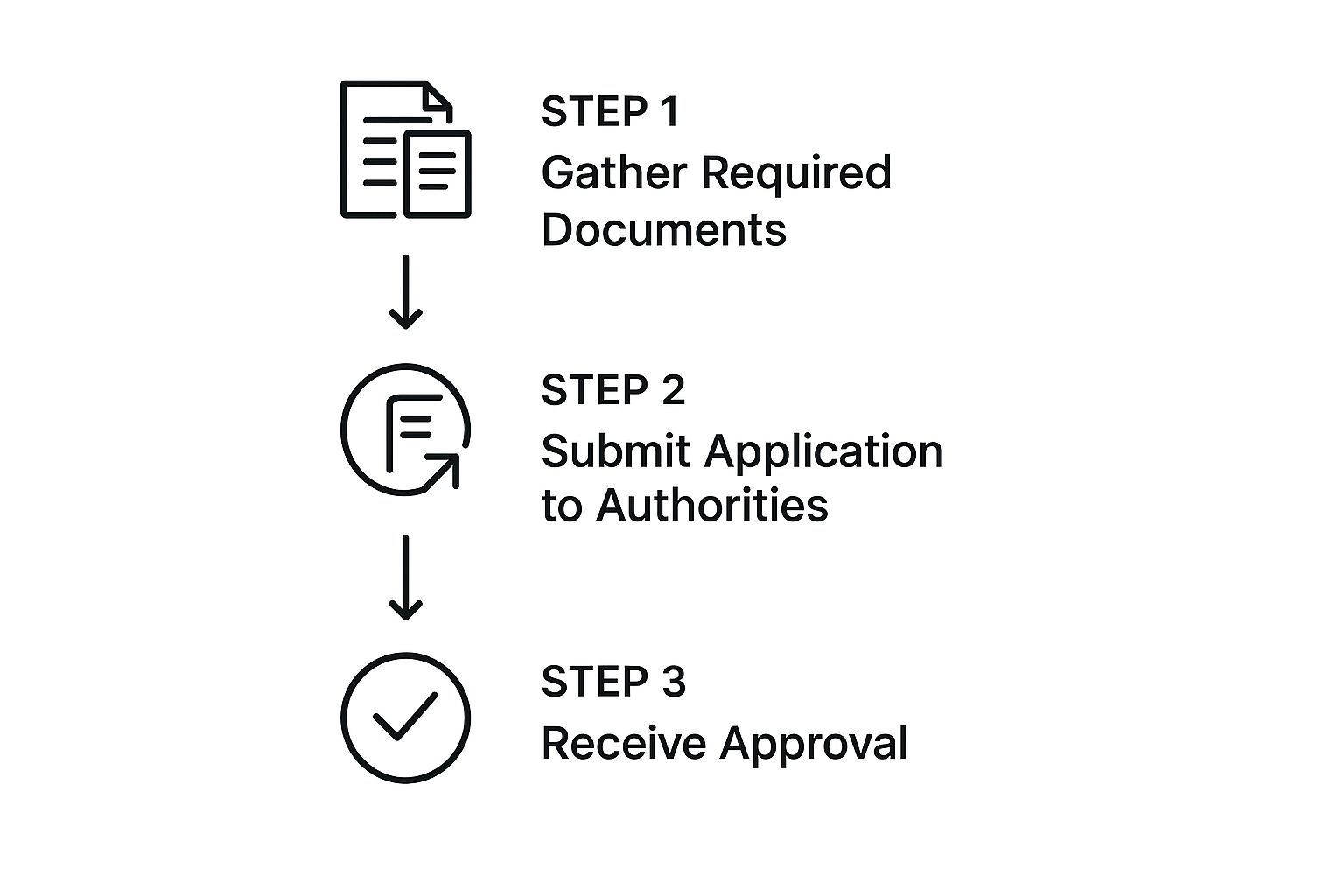
As you can see, it's a logical progression. Nailing the document collection phase sets the foundation, leading to the official submission and, finally, the visa itself.
The Mandatory Medical Fitness Test
This is a non-negotiable part of the process. Every single person applying for a UAE residency visa has to pass a medical fitness test. It’s a public health measure, designed to screen for specific communicable diseases. The whole thing is a standard procedure carried out at government-approved medical centres across the Emirates.
The test itself is pretty straightforward and has two main components:
- A Blood Test: This is used to screen for infectious diseases like HIV and Hepatitis B.
- A Chest X-Ray: This is to check for any signs of Tuberculosis (TB).
You can't just pop into any local clinic for this. You have to go to a designated DHA (Dubai Health Authority), SEHA (Abu Dhabi Health Services Company), or another officially approved medical fitness centre. If you're in a hurry, many centres offer fast-track services that can get you results in as little as 24-48 hours, although the standard turnaround is a few days. The best part? The results are sent electronically straight to the immigration authorities, so you don't have to worry about collecting and submitting them yourself.
Finalising the Visa Stamping and Emirates ID
Once the medical results are in and your application gets the green light, you're on the home stretch. The next step is to hand over your spouse’s passport to the immigration authorities for the visa stamping. This is the moment it all becomes official. A residency visa sticker is placed inside their passport, cementing their legal status in the UAE.
Around the same time, your spouse will need to provide their biometrics for their Emirates ID card. This means a quick trip to a Federal Authority for Identity, Citizenship, Customs & Port Security (ICP) service centre for fingerprints and a photograph. The Emirates ID is an absolutely essential piece of kit here, used for everything from opening a bank account to getting medical care.
From the moment you submit the application to getting the stamped passport and Emirates ID in hand, the whole process can take anywhere from a few days to a couple of weeks. This really depends on the service speed you've chosen and how busy the immigration department in your specific emirate is. This final stage is where working with a good PRO service can be a real advantage, helping you avoid any last-minute hiccups.
Breaking Down the Costs and Timelines
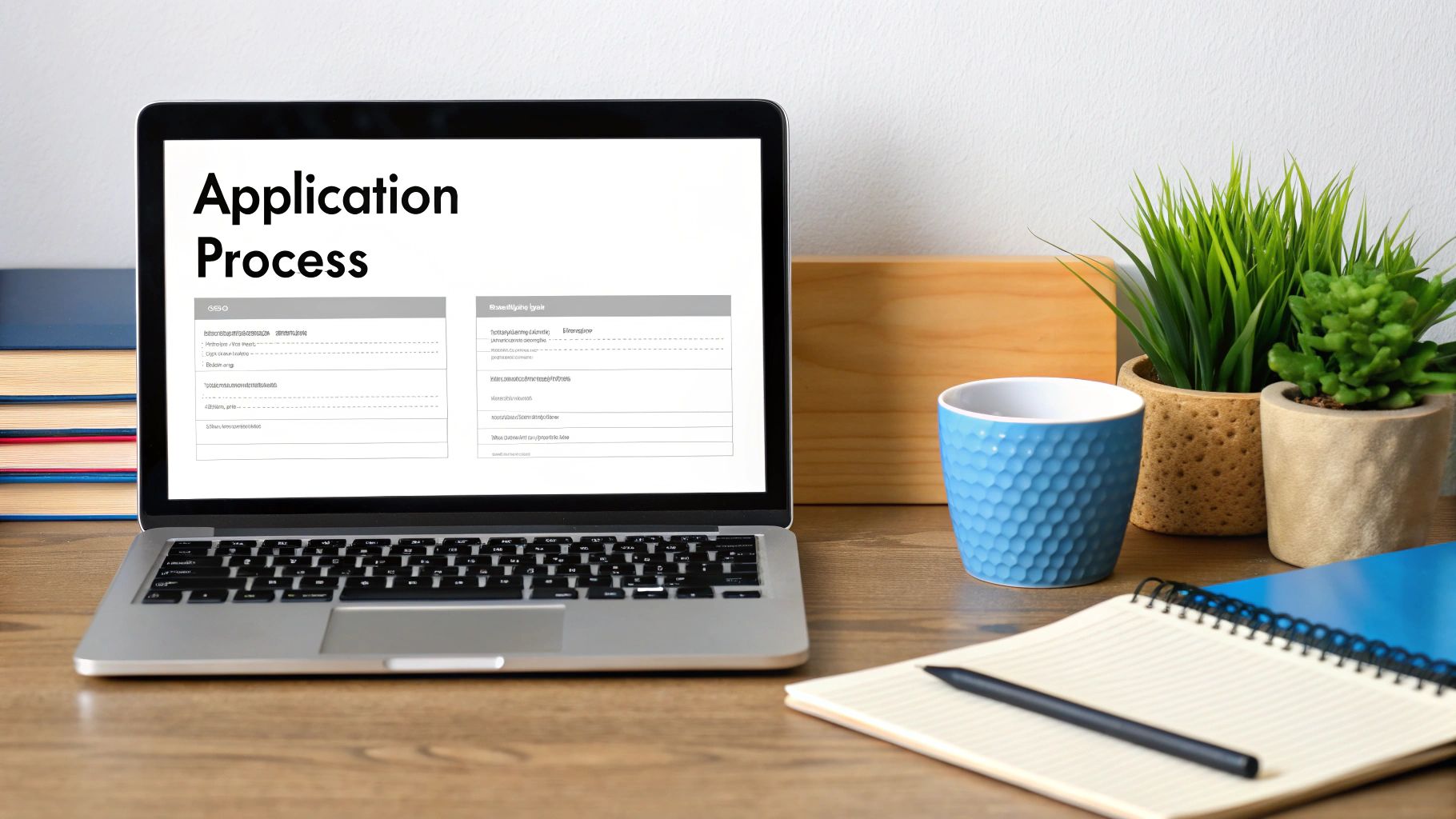
Let's get practical. When you're planning to sponsor your spouse, two big questions always come up: How much is this going to cost, and how long will it all take? Getting a clear picture of the financial and time commitments right from the start is the key to a smooth, stress-free process.
Applying for a UAE spouse visa isn't just about paying one single fee. Think of it more as a series of smaller costs for each step, from getting your marriage certificate attested to the final visa stamping in the passport. In the same way, the timeline isn’t one long waiting game but a sequence of stages, each with its own schedule.
A Transparent Look at the Expected Costs
To budget properly, you need to account for every little expense, especially the ones people often forget. Government fees can and do change, but the breakdown below gives you a realistic idea of what to expect. This way, you can avoid any nasty financial surprises.
And don't forget, if you use a typing centre or a professional PRO service, their fees will be extra. It's often money well spent, though, as they make sure everything is filled out correctly and submitted efficiently, saving you headaches down the line.
Here’s a look at the typical fees and charges you can expect to pay during the spouse visa application. Just remember, these are estimates and can vary slightly.
Estimated Cost Breakdown for a UAE Spouse Visa
| Service / Fee | Estimated Cost (AED) | Important Notes |
|---|---|---|
| Entry Permit Application | AED 1,000 – 1,200 | Needed if your spouse is outside the UAE. It’s the first major step. |
| Visa Status Change (In-Country) | AED 600 – 700 | This applies if your spouse is already here on a visit visa and you're changing their status from within the UAE. |
| Medical Fitness Test | AED 300 – 700 | The price depends on how quickly you need the results. A 24-hour service will cost more than the standard option. |
| Emirates ID Application | AED 270 – 370 | The fee is based on the visa's validity period, typically one or two years. |
| Visa Stamping Fee | AED 500 – 600 | This is the final government charge to get the residency visa sticker physically placed in the passport. |
| Document Attestation | AED 500+ | Costs can really add up here, depending on your home country and how many documents need stamping. This is a per-document fee. |
| Legal Translation | AED 150 – 250 | For translating your marriage certificate into Arabic. This must be done by a sworn legal translator. |
| Typing Centre / PRO Service Fees | AED 300 – 1,000+ | These charges cover the typing and submission of your application. Prices vary a lot based on the provider. |
All these smaller fees add up, so it's wise to budget a little extra to cover any unexpected costs.
A common mistake is underestimating the "hidden" costs. Document attestation, legal translation, and service centre fees can easily add another AED 1,000 or more to your total budget. Factoring these in from the beginning is key to a predictable financial plan.
Mapping Out the Visa Processing Timeline
Besides the cost, understanding the timeline helps you manage expectations and plan everything, from your spouse's travel to their start date for a new job. The whole journey, from gathering documents to getting the Emirates ID card in hand, can take anywhere from a few weeks to over a month.
The biggest variable? How quickly you can get your documents ready, especially the attestation process.
Here’s a realistic look at how long each phase usually takes:
- Document Collection and Attestation (1-4 weeks): This is the wild card. Getting your marriage certificate attested in your home country and then again here in the UAE can be a lengthy affair. Plan ahead for this one.
- Entry Permit or Status Change (2-5 working days): Once your complete application is in the system, the initial approval is usually pretty quick.
- Medical Test and Emirates ID Biometrics (1-3 working days): You can get the medical test done in a single day. The results can take anywhere from 24 hours to a few days, depending on the service package you choose.
- Final Visa Stamping (3-5 working days): After you get the all-clear from the medical test, the passport is submitted for the final visa sticker. This usually takes a few business days.
So, once you have all your attested documents ready to go and submit the application here in the UAE, the local processing part can be wrapped up in as little as 7-10 working days. The takeaway here is that preparation is everything. The more organised you are with your paperwork upfront, the faster the whole thing will go.
For busy entrepreneurs and investors, our corporate PRO services can handle this entire process for you, letting you stay focused on your business.
Renewing Your Spouse Visa and Staying Compliant
Getting your spouse's residency visa stamped is a huge relief, but the journey doesn't end there. The real key to a settled life in the UAE is keeping that legal status current. Think of the initial visa approval as laying the foundation; now it's about maintaining the structure through timely renewals and staying on top of the rules.
The UAE spouse visa has a set expiry date. You'll typically need to renew it every one to three years, and this timeframe is tied directly to the validity of your own residency as the sponsor. Missing this renewal window is a costly mistake that can lead to fines and a lot of unnecessary stress. It's a deadline you absolutely cannot ignore.
The Visa Renewal Process in a Nutshell
When it's time to renew, you'll find the process feels quite familiar—almost like a simplified version of the first application you put together. The main goal is to show the authorities that the original conditions for the sponsorship are still being met. This means your job, salary, and valid marriage certificate are all still in order.
You’ll be asked to provide an updated set of documents to prove you're still eligible to be a sponsor. So, get ready to gather paperwork very similar to what you submitted the first time around.
The core requirements for renewal almost always include:
- Updated Sponsor Documents: This means your renewed passport and Emirates ID, plus a recent labour contract or salary certificate from your employer.
- Spouse's Original Passport and Emirates ID: Both are essential for the renewal application and the final visa stamping.
- Renewed Tenancy Contract (Ejari): You need to provide proof of your current, valid accommodation.
- A Fresh Medical Fitness Test: Yes, your spouse has to do the medical test all over again. It’s a mandatory part of every single residency visa renewal in the UAE.
Navigating Critical Life Changes
Life is unpredictable, and your circumstances can easily change during the one to three years your spouse's visa is valid. Knowing how these changes impact their residency status is absolutely crucial for staying compliant and out of legal trouble.
One of the most common situations is the sponsor changing jobs. If you move to a new company, your own residency visa is cancelled and then reissued under the new employer. Because your spouse's visa is directly linked to yours, you have to formally transfer their sponsorship to your new visa as soon as it's stamped. This doesn't happen automatically; it's a specific process you must initiate.
A Real-World Scenario: Picture an engineer in Sharjah who lands a better job in Dubai. His current visa gets cancelled, and he begins the process for a new one with his Dubai-based company. His wife's visa, which he sponsors, is still technically valid during this grace period. However, the moment his own new visa is stamped in his passport, he must start the process to move her visa under his new sponsorship. Delaying this can create serious complications.
For a detailed walkthrough of this process, you can find valuable information in our guide covering visa renewal in Dubai.
The Six-Month Rule and Other Compliance Points
Another critical piece of regulation is the six-month absence rule. If any UAE resident—including someone on a spouse visa—stays outside the country for more than 180 consecutive days, their residency visa can be automatically nullified.
This is a very strict rule. If your spouse needs to be abroad for an extended period for family or other reasons, it's vital to plan their travel so they return to the UAE before hitting that six-month mark.
Finally, what if your own visa is cancelled and you're leaving the UAE for good? As the sponsor, you are legally obligated to cancel your spouse's dependent visa as well. If you don't, you can rack up fines and face potential legal issues down the line. A proper cancellation ensures a clean exit record for both of you, which is essential if you ever want to return to the UAE. Managing these lifecycle events is exactly where expert PRO services become invaluable, ensuring every step is handled correctly and efficiently.
Your Top UAE Spouse Visa Questions Answered
When you're dealing with something as important as a spouse visa, a million questions can pop into your head. After helping countless couples get settled in the UAE, we’ve pretty much heard them all.
Getting straight answers to these common queries can save you a lot of stress and help you avoid simple mistakes that could derail your application. So, let’s dive into the questions we get asked most often.
Can a Wife Sponsor Her Husband in the UAE?
Yes, she absolutely can, but it’s not as straightforward as when a husband sponsors his wife. The authorities have stricter rules in place for female sponsors to make sure they can financially support their husbands.
Typically, a wife wanting to sponsor her husband needs to work in a specific professional field, like medicine, engineering, or education. The salary requirement is also higher – she’ll usually need to earn at least AED 10,000 a month, or AED 8,000 if her company provides accommodation. Keep in mind that immigration officials often look at these applications on a case-by-case basis.
Because the rules are tighter and approvals can be discretionary, it’s a smart move to get professional help for this type of sponsorship. An expert can build a strong application that ticks every box and clearly shows you meet all the criteria.
What Should I Do If My Visa Application Is Rejected?
Getting a rejection notice is tough, but it doesn't have to be the final word. The tricky part is that immigration authorities rarely tell you why it was denied, leaving you to play detective.
More often than not, rejections come down to small mistakes: a typo in the application, a missing document, a marriage certificate that hasn’t been attested, or not meeting the salary requirement. Your first move should be to go over every single piece of paper you submitted with a fine-tooth comb. The problem is often a minor oversight. Once you find and fix it, you can apply again.
This is where a professional PRO service can be a lifesaver. With their experience, they can spot issues you might miss and make sure your second application is flawless, which seriously boosts your chances of getting it approved.
Can My Spouse Work on My Sponsorship?
Definitely. This is one of the biggest perks of the spouse visa. As soon as your husband or wife has their residency visa stamped in their passport under your sponsorship, they are legally allowed to work in the UAE.
Once they land a job, the process is simple. Their new employer takes care of getting a work permit (sometimes called a labour card) from the Ministry of Human Resources and Emiratisation (MOHRE). The key thing to remember is that you remain their visa sponsor. The work permit is just the official green light for them to work for that specific company. It's a very common and standard procedure here.
How Does a Divorce Affect the Spouse Visa?
This is a serious legal situation that you have to handle correctly. A divorce dissolves the legal basis for the sponsorship. As the sponsor, it is your legal duty to formally cancel your ex-spouse's residency visa.
After the visa is cancelled, your ex-spouse gets a grace period, which is usually 30 days. In that time, they must find a new sponsor (like a new employer), switch to a different visa category (like an investor visa), or leave the country. If you fail to cancel the visa, you could face hefty fines and legal trouble.
At PRO Deskk, we know how overwhelming the visa process can be. Let us handle the paperwork so you can focus on building your life and business in the UAE.
✅ Specialists in Mainland Company Formation in Dubai, Sharjah & Abu Dhabi
✅ Specialists in Freezone Company Formation across the UAE
✅ Specialists in Golden Visa on Property and Investor Visa
✅ Specialists in Corporate PRO Services and Attestation Services
✅ 24/7 Support Service – Always here when you need us
✅ Cost-Effective Business Setup Solutions tailored to your needs
✅ Enjoy UAE Tax Benefits for International Entrepreneurs
📞 Call Us Now: +971-54-4710034
💬 WhatsApp Us Today for a Free Consultation at https://prodesk.ae




